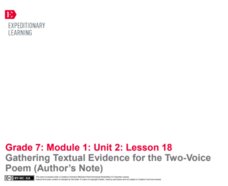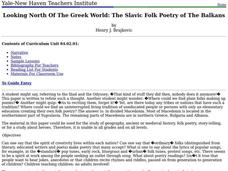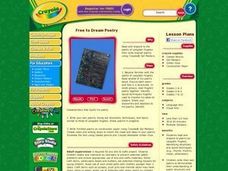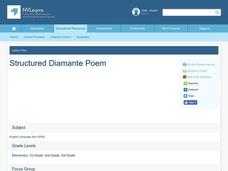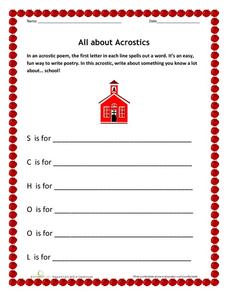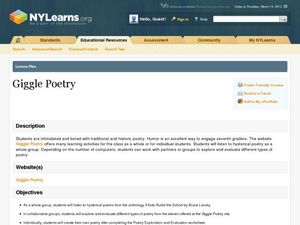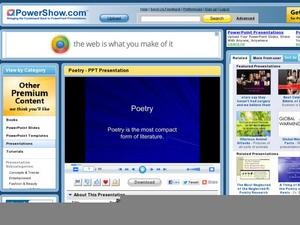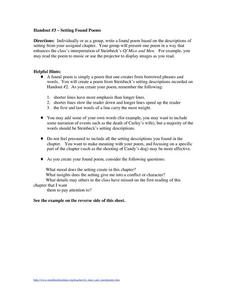Curated OER
1900 America: Primary Sources and Epic Poetry
Using Walt Whitman's Song of Myself and Hart Crane's The Bridge as models, class groups first craft their own epic poems for 1900 and, using primary sources, create a multi-media presentation that captures the sights and sounds of life...
Curated OER
The Kite Runner: Setting Poem
To gain a deeper understanding of the importance of the settings in The Kite Runner, readers use the provided poem frame to create three poems, one for each of the settings in Hosseini's novel.
Curated OER
A Garden of Verses: Poems About Class Gardens
Students explore botany by participating in a language arts activity. In this garden poetry lesson, students read the classic poem "Mary, Mary Quite Contrary" and discuss the imagery and rhyming methods used. Students examine their own...
Curated OER
The Poetry Archive
Listening to poems about feeling lonely and feeling like an outsider set the stage for a group activity that focuses on Stevie Smith's "Not Waving But Drowning." Groups examine the three stanzas of Smith's poem separately and identify in...
Angel Island Immigration Station Foundation
Moving to the Poems of Angel Island
A poem carved on Angel Island's walls is the guiding text of a lesson that challenges scholars to put movement into a written piece of art. After warm up-activities, learners play a game of "Pass the Clap" and "Pass the Line," in which...
Teacher's Guide
Valentine's Day Acrostic Poem
L is for loving this Valentine's day acrostic poem in which class members use letters from the word love to guide their creative writing. Four different versions for you or your scholars to choose from make this poetry activity a win for...
Curated OER
Lincoln is in the House! ("Name-Dropping" Poems and the Power of Connotation)
“What’s in a name?” Just about everything. Barack Obama, Vincent van Gogh, Justin Bieber. Famous names evoke a multitude of reactions and poets often use the names of famous people in their works precisely because names carry...
Curated OER
Reading Poetry in the Middle Grades
Bring the beauty of "Nothing Gold Can Stay" by Robert Frost to middle school language arts. After learners read a copy of the poem, they follow an instructional sequence that focuses on sound, figurative language, and theme.
EngageNY
Seeing, Hearing, and Comparing Genres: A Poem and a Letter
One can never be too prepared. Pupils prepare for their upcoming mid-unit assessment by writing their group norms for small group discussions. Additionally, scholars read and listen to a poem, comparing the two experiences using a Venn...
EngageNY
Performance Task: Two-Voice Poem Readings
Eye contact, volume, and pronunciation are key ingredients to a successful presentation. Pupils present their two-voice poems to the class with their poetry reading partners. Next, to wrap up the unit, scholars use a worksheet to reflect...
EngageNY
Gathering Textual Evidence for the Two-Voice Poem (Author’s Note)
Writers take a look at how to gather evidence from the information text in the unit that connects to Salva and Nya’s story. They complete a Gathering Evidence from Informational Texts sheet to guide their work. Pupils then use the...
Curated OER
Looking North Of The Greek World: The Slavic Folk Poetry of The Balkans
Showing how folk poetry keeps alive national heritage is the stated goal of this proposal for a unit on the poetry of the Balkans.
Curated OER
Acrostic Poem Pals
Students work in groups to determine a creative writing theme. They listen to each other to produce a group acrostic poem and then collaborate with their partners to recite their poetry. They then add drawings to add an artistic element...
Curated OER
Free To Dream Poetry
Students explore the poetry of Langston Hughes and its structure. In groups, they read poems and identify the rhyme, rhythm meter, and alliteration in each poem. Students create and illustrate their own poem, using Langston Hughes methods.
Curated OER
Structured Diamante Poem
Youngsters review nouns, adjectives and verbs. In this poetry lesson, readers choose a set of antonyms and create a list of synonyms, verbs and adjective for each. Students use the words to write a Diamante poem.
Education.com
All About Acrostics
Spell out your first day excitement with S-C-H-O-O-L! Use a worksheet to fill in words for each letter to create a unique acrostics poem.
Columbus City Schools
Poetry Speaking and Listening Standards
Celebrate April's National Poetry Month or enrich a poetry unit with a wealth of language arts material. Class members develop an oral interpretation of a poem and/or develop a podcast interview with a poet.
Curated OER
Using Creative Dramatics With the Teaching of Poetry
Launch your poetry unit in a very dramatic way. Divide your class into groups, and give each group a different poem. After discussing the poem, each group member selects a stanza to study. The group then develops a skit that represents...
Curated OER
Giggle Poetry
Poetry can be fun! To set your pupils giggling, have them listen to poems from If Kids Ruled the School by Bruce Lansky. Then, they can study the different types of poetry on www.gigglepoetry.com, and choose one form on which to base...
Curated OER
Poetry Walk
Explore with your class the purposes and author's intents for poetry titles. First you read several brief poems to the class and discuss how the authors may have chosen the titles. Then small groups read title-less poems posted around...
Curated OER
Introduction to Poetry Lesson Plan
Analyze poetry in a group setting. Middle and high schoolers read lyrics to a Tom Petty song and free write about the song's tone, setting, and speaker. They then complete the same activity in a group setting using seven poems. The...
Curated OER
Poetry: The Most Compact Form of Literature
Introducing or need to review literary devices and terms for a study of poetry? Though text heavy, the explanations and examples of key poetic devices will provide learners with the vocabulary they need to discuss and craft poems.
Curated OER
Handout #3-Setting Found Poems
What is a Found Poem? Use excerpts of the setting presented in John Steinbeck's Of Mice and Men to inspire Found Poetry. An explanation is given, and the second page houses an example of a Found Poem inspired by Black Boy, but you'll...
Curated OER
Acrostic Book Report
Students read the story Wild Horse Winter and construct acrostic poems. In this poetry lesson, students use adjectives and events in the text to develop an acrostic poem.












